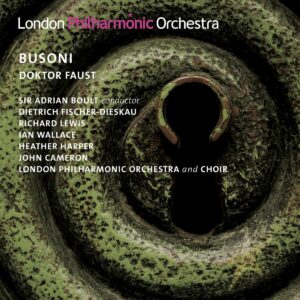Goethe proclaimed that “only Mozart” (who had already died) was capable of writing an opera based on his Faust. That did not keep others from trying. Arrigo Boito succeeded resoundingly with Mefistofele, Berlioz’s “légende dramatique” La Damnation de Faust offers the most boldly literal operatic take, and Gounod’s Faust (formerly known as Marguerite) makes it an example of how grand French opera should be. German-influenced and -based composers found the Goethe-model a little too daunting. From Louis Spohr via Ferrucio Busoni to Alfred Schnittke, they all tackled the subject from different directions. Busoni, the composer at hand, used the 16th-century puppet plays–Goethe’s source of inspiration–to avoid direct comparison. But he also drew on Heinrich Heine’s Der Doktor Faust–Ein Tanzpoem and probably on the 19th-century parody Faust III by Friedrich Theodor Vischer. And what a fabulous opera he created in the process!
Somehow there are only five recordings of Busoni’s Doktor Faust. Only four are on CD; only three are reasonably complete: Leitner (DG), Nagano (Erato), and Netopil (Oehms). Jordan (Arthaus Musik) comes on DVD/Blu-ray only–and then there’s this one with Adrian Boult, the odd one out. Welcome though they all are, because Doktor Faust is such an interesting off-the-beaten-path work of the Italian-flavored German romantic school (like an inverse Wolf-Ferrari), Boult’s live 1959 radio broadcast, released on LPO’s own label, raises an eyebrow or two. Boult cut Doktor Faust down to nearly a third of the original. We get some 75 minutes of the radio broadcast which may or may not actually be complete. Don’t let’s pretend that the cuts are necessarily an automatic disqualifier. There aren’t many operas that suffer when judiciously cut (and many that gain). But more than half?
The idea of a concert abridgement is good–for a concert: Get a well-cut opera down to digestible size for a regular evening’s worth of concert hall entertainment and thus bring the work (and, let’s be honest, the composer) to a wider audience than it otherwise would ever have. On disc (or streamed) such an executive summary may be still convenient just to get the gist, but there’s a good argument that much the same effect can be achieved with a fast-forward button, using a complete–and much better sounding–recording. And therefore why put up with Boult and his cuts, the mid-performance fade-ins, and terrible sound?
Even if you insist on Dietrich Fischer-Dieskau as your Faust, there’s Ferdinand Leitner’s studio recording in Munich’s Herkulessaal from just a few months before that, but for some background hiss, still sounds fabulous. For Boult the soloists sing well and are quite well caught on tape; Richard Lewis’ sly, slightly accented Mephistopheles is neatly creepy. Heather Harper’s is a wonderful Duchess of Parma (rather a short cameo though it is), especially in duet with FiDi. But the orchestra is recessed and the strings scrawny.
If you want the whole thing, get Nagano, who delivers all the notes and then some–those by Busoni and Jarnach (Busoni’s student who completed the unfinished score) and those of alternate “completist” Antony Beaumont. Dieskau brings wonderful bluster to his Faust (especially here; less so with Leitner), but his one-time student Dietrich Henschel is more precise and Nagano is at his (unpredictably occurring) most impressive, which, when it happens, is a treat.
Both Leitner and Nagano very successfully navigate their way through the renaissance sounds and chorales, the romantic-chromatic haze, the expected Wagnerian touches, and unexpected moments of Offenbach. I attended the performance that ended up on the live recording from the Bavarian State Opera on Oehms; the cast is very good but Tomáš Netopil’s labored way through the incomplete, “Busoni-only” score lets the recording down. That’s not something Boult suffers from, but it’s not really a recommendable recording, all the same.
































